The Welsh village name with more than 20 spellings
On the face of it, the peaceful village of Trellech is just like many others in rural Wales. So why does it have upwards of 20 historical spellings - with four still in use today?
Head to Trellech, in rural Monmouthshire, and you may spot something unusual.
Alongside the typical village attractions - the summer fetes and dog shows - is an array of spellings likely to leave even the most hardened traveller scratching their head.
Signs leading into the village varyingly read Trelech with one 'l', Trelleck with a 'ck', as well as Trellech and Tryleg - the official spellings in English and Welsh.
The rambling houses and barns are a mishmash of Trellech, Treleck and Trelleck, while an old county map tucked away in a local cottage reads Trylegh.
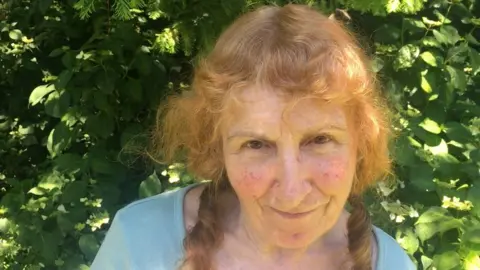
In fact, Trellech, with its 14th Century church and welcoming pub with open mic nights, has upwards of 20 - perhaps even 30 - historical spellings, four of which are still commonly in use today.
Prof Hywel Wyn Owen, the former director of the Place-Name Research Centre at Bangor University, said: "Although it was quite common for places to have many historical spellings, Trellech stands out because of the way the locals have preserved these variants and kept them going.
"It is very unusual to have four spellings still in use in 2018. In fact, I don't know any other place like it."
It's a peculiar situation for the modern world, and one that divides the locals.
Resident Stephanie Poulter, 72, who breeds Exmoor ponies, said: "It really is very confusing to an outsider.
"The Met Office uses the unofficial Trelleck, as does the Royal Mail.
"We sign off our letters with whatever spelling we want. It's fun."
Frank Olding, a local place-name enthusiast, said: "I think the spellings are great.
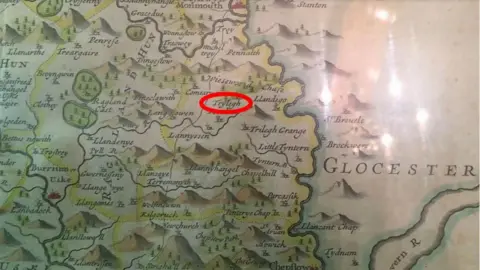
"People have endless things to talk about, and the village should capitalise on it."
But Larry Stoter, who lives in nearby The Narth, said: "I'm sure some people don't like it.
"I often drive down the winding B roads and I'm sure there used to be a lot more road signs with different spellings.
"They seem to have come down in recent years."
Whatever the local view on the matter, the story of Trellech is one steeped in history and language.
Records collated by the Place-Name Research Centre in Bangor show the oldest record, from 1132, to be Trylec.
Hop forward two centuries and it is Trillek.
Hit the 1400s and there is a choice of Tryllek or Trilleg. And in 1763, it is Trellage.
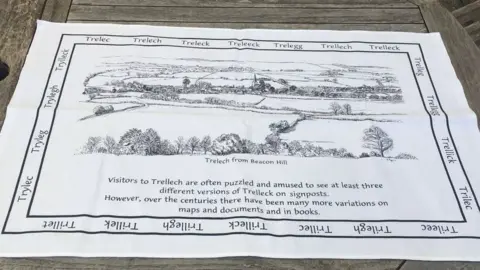
In fact, so many different options are recorded in historical documents such as wills, leases and court papers, no-one as yet has been able to come up with a definitive tally.
Community councillor, Alan Poulter, 73, said: "A tea-towel on sale around the village proffers 22 options, including Treleeck and Trillet.
"A local book, Trellech 2000, published to celebrate the millennium, suggests 23.
"The Trellech United Community Council website raises this to 26. There may even be over 30 - who knows?"
Although this may seem quirky, experts insist it is not unusual for places to have myriad spellings.
Cardiff (Caerdydd), for instance, has been varyingly spelt a snazzy Kardif, Kaerdyf and Kerdyf.
Tintern was once Tyntern; Usk, Uske.
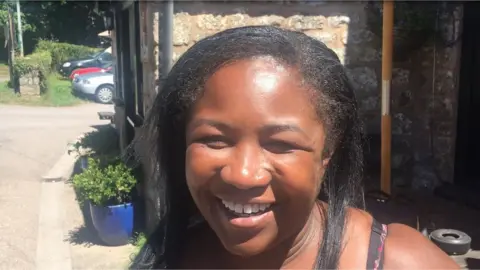
English places too aren't immune.
London has been Londinium (Latin) and Lunden (Anglo-Saxon).
Leicester has upwards of twenty recorded historical spellings, including Legrecestra (1126), Leiercestria (1155), Laycestre (1230) and Lester (1613).
York - with its Roman and Viking influences - has been varyingly known as Eβóρακον (c.150), Eburaco (4th Century) Eferwic (10th Century) and Yarke (1619).
Dylan Foster Evans, head of Cardiff University's School of Welsh, said: "Between the 13th and 17th centuries, there was simply no need to write words down in a consistent manner or formalise one correct spelling.
"Even common English words could have hundreds of different spellings, so leg might have been written legg or legge. There was no impetus to agree."
Undoubtedly, much of the mystery surrounding Trellech's many spellings stems from its history.
Today, Trellech is a village of fewer than 3,000 people, comprising a small primary school, village hall and simple store selling local produce, such as bacon and cakes.
But during the Middle Ages, the village grew into one of Wales' major trading hubs until it was practically wiped out during the Black Death of the 14th Century.
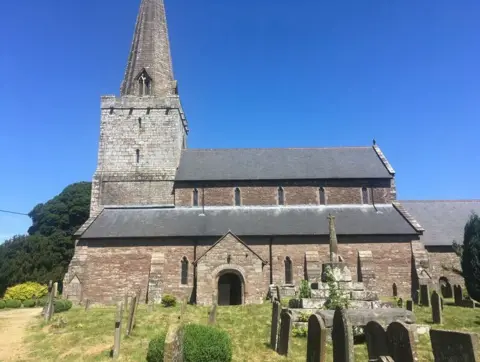 Gwyneth Rees
Gwyneth ReesLocated close to the Welsh/English border, both languages were used, alongside French in Norman times, helping to tot up the tally.
There was also likely confusion over what the village was initially named after.
According to the Dictionary of the Place-Names of Wales, there are two local typographical landmarks from which the diverging words may have originated.
The first is a large, conspicuous, stone that once stood a mile or so north of the village.
In Welsh, this might have resulted in 'try' (a prefix to show something is big) and 'lleg' (a lost noun for a stone).
Alternatively, some may have referred to the three standing stones (Harold's Stones) on the village outskirts - tri meaning three.
The word town (tre) may have also played a part.
So many possibilities - and all perfectly plausible to the weary medieval traveller wondering where they had landed and scribbling down their best guess.
But still the most remarkable thing is that four variants are still in common use, bucking the trend to standardise that grew in the 19th and 20th centuries.
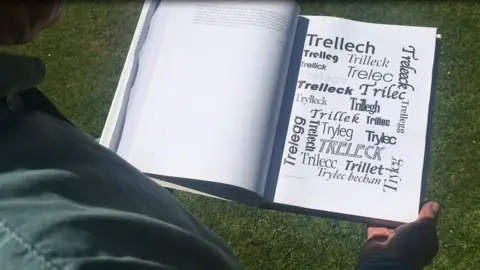
Dr Simon Horobin, professor of English language at Oxford University, said: "I suspect that the reason that Trellech has clung on to the variants for so long is that it is a small place with less need for a fixed official form.
"The different spellings might also have become important to its identity.
"Perhaps the residents take pride in this idiosyncrasy and so deliberately preserve it, resisting the pressure to adopt a single standard form."
Prof Hywel Wyn Owen added: "Strangely, sat-navs and other maps are often slow to change to official spellings, but often stick with the most popular, helping to fossilise old forms."
It is, though, perhaps best not to get too worked up about these things.
Dylan Foster Evans added: "Undoubtedly, there is confusion.
"Even the current English spelling (Trellech) seems in fact very Welsh, until you realise the double 'l' and the 'ch' are not pronounced the Welsh way.
"It is not so much the number of spellings that makes Trellech interesting, but the history and interplay of languages behind them.
"It's a little window on to how people thought of the village and I'm sure locals are proud of the variety."
